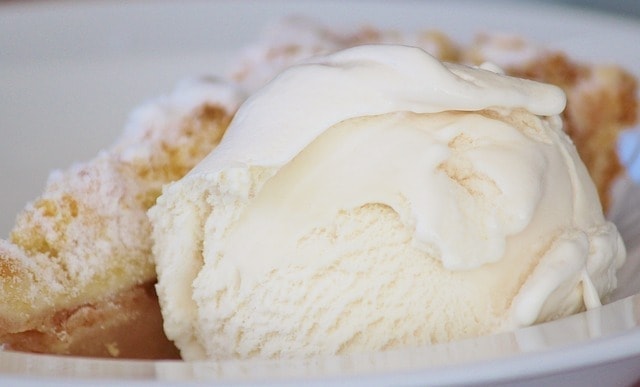Vanilla is one of the most beloved flavors, enjoyed in a variety of treats, from ice cream to cakes and cookies. But is it safe for dogs to eat? In this blog post, we will explore the potential benefits and risks associated with feeding your pup vanilla-flavored treats. We’ll consider the opinions of both canine nutritionists and veterinary experts to determine if vanilla is safe for your four-legged friend. We’ll also look at how different types of vanilla-flavored treats could affect your pup’s health. With this knowledge, you can make an informed decision about whether vanilla is safe for your pup to consume.
Is it Safe to Feed Your Dog Vanilla?
Therefore, if your dog were to snare and consume a vanilla pod, it is unlikely to result in any serious issues other than, perhaps, a slight stomach upset.
This could be much more dangerous if they counter surfed and drank an entire bottle of vanilla extract.
Due to the high alcohol content in vanilla extract and flavoring, dogs should not consume any of it. This is especially true for smaller dogs.
Although only a few drops of vanilla extract are typically used in baking, it is not recommended to feed your dog cakes or other sweet treats because they may contain amounts that could cause a problem.
High sugar intake could be detrimental to one’s dental health, diabetes, and obesity. Additionally, baked goods frequently include a lot of rich ingredients, such as dairy, which can cause stomach upsets. Most seriously, artificial sweeteners like xylitol are frequently added, and even in very small amounts, it is highly toxic to dogs. Additionally, cakes frequently contain chocolate and raisins, both of which are toxic.
Alcohol Toxicity In Dogs
Due to the liver’s inability to process alcohol, even small amounts of ethanol can cause alcohol toxicity in dogs. Dizziness, disorientation, hypersalivation, vomiting, diarrhea, and eventually loss of consciousness and seizures are among the signs.
You should seek veterinary assistance as soon as you can if you are aware that your dog consumed alcohol, including alcohol present in vanilla and other extracts. Within a few minutes of ingestion, symptoms can appear, but you shouldn’t wait because by then the damage may already be done. Your dog’s vital signs will be monitored by your veterinarian for indications of respiratory and other serious issues.
Inducing vomiting may be a part of the treatment, particularly if your dog hasn’t yet displayed signs of alcohol poisoning. Treatment for more severe cases may include intubation and the administration of anti-seizure medication.

Some owners continue to give their dogs treats that contain alcohol despite the significant risks. Some contend that since only a very small amount of vanilla extract is added, the alcohol is greatly diluted and does not endanger dogs. This is particularly risky if you have a small or toy breed, but is it worth the risk?
Some forms of vanilla extract are labeled as alcohol-free extract. Instead of ethanol, these frequently use vegetable glycerin for the extraction process. This straightforward substance has no flavor or odor and is non-toxic. It has a sweet flavor, but because it will only be used in very small amounts, this flavor is unlikely to transfer to the foods you use it in.
With the exception of allergic reactions, vegetable glycerin is perfectly safe for your dog to consume, so vanilla extract made from vegetable glycerin is also thought to be safe for canine consumption.
The use of the solution in commercial dog foods is encouraged by the way it acts as a binding agent and maintains the chewy texture of the food.
Vanilla can also be consumed by dogs through prepared and existing foods. It is mostly utilized in desserts and sweet foods like ice cream and yogurt. It may also be found in cakes and biscuits. You must carefully review the ingredients and weigh the benefits and drawbacks of each of these foods.
Analyze the type of added vanilla flavor as well as any additional or supplemental ingredients.
Many sweet treats include sugar. Although sugar is not toxic to dogs, if given to them frequently, it can quickly cause them to gain weight and even cause behavioral problems.
However, a worse ingredient than sugar is an artificial sweetener. One of the most common artificial sweeteners is xylitol.

Can Dogs Have Vanilla Extract?
Vanilla extracts are used in some recipes, including those for natural dog treats. Making vanilla extract begins with softening the vanilla, usually with an ethanol and water mixture. When alcohol is extracted, a liquid with at least 35% alcohol is produced, which can be extremely hazardous for dogs.
FAQ
What happens if dogs eat vanilla?
Because of the high alcohol content, both vanilla extract and imitation vanilla are toxic to dogs. Your dog is at risk for alcohol poisoning if he consumes too much alcohol because dogs cannot break down alcohol in their systems.
Is vanilla ice cream bad for dogs?
Give your dog only ice cream devoid of xylitol, macadamia nuts, chocolate, or coffee beans. When in doubt, choose vanilla—even better, low-fat vanilla. For your dog, think about an alternative to ice cream, such as homemade frozen treats made with ingredients that are safe for dogs or gelato made especially for them.
Is vanilla cake toxic to dogs?
Depending on how much of the vanilla cake she consumed, your dog should be fine. Vanilla cake is not toxic, but it contains a lot of sugar, which dogs should not consume.
Is vanilla scent okay for dogs?
Vanilla. Some scents are pleasant to canines because of their effect. Your dog may not know why he likes vanilla. According to a study that appeared in the journal Applied Animal Behaviour Science, it has a calming effect on rescue dogs that are mixed-breed.